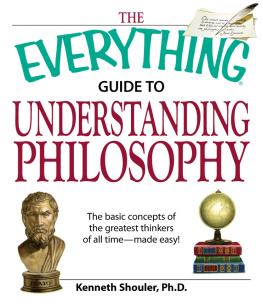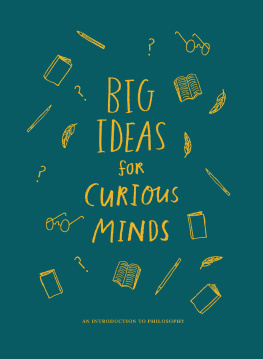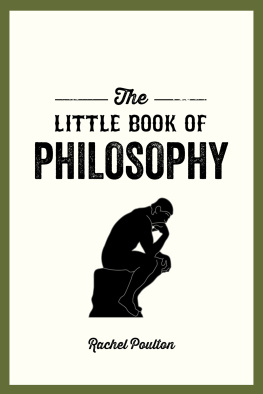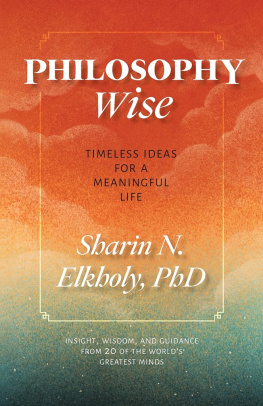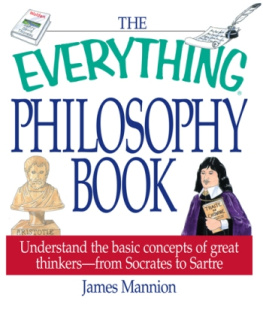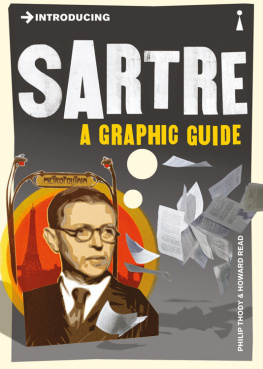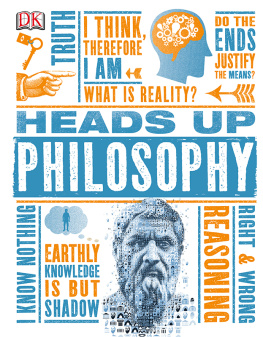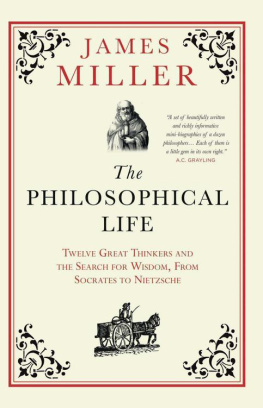PHILOSOPHY
A BEGINNERS GUIDE TO THE IDEAS OF
100 GREAT THINKERS
JEREMY HARWOOD


New York London
2010 by Jeremy Harwood
All rights reserved. No part of this book may be reproduced in any form or by any electronic or mechanical means, including information storage and retrieval systems, without permission in writing from the publisher, except by reviewers, who may quote brief passages in a review. Scanning, uploading, and electronic distribution of this book or the facilitation of the same without the permission of the publisher is prohibited.
Please purchase only authorized electronic editions, and do not participate in or encourage electronic piracy of copyrighted materials. Your support of the authors rights is appreciated.
Any member of educational institutions wishing to photocopy part or all of the work for classroom use or anthology should send inquiries to Permissions c/o Quercus Publishing Inc., 31 West 57th Street, 6th Floor, New York, NY 10019, or to .
ISBN 978-1-62365-264-7
Distributed in the United States and Canada by Random House Publisher Services
c/o Random House, 1745 Broadway
New York, NY 10019
www.quercus.com
Contents
What is philosophy?
Philosophy, the great Greek philosopher Plato wrote, begins in wonder. Since his time, countless thinkers have tried to pin down exactly what philosophy is. Put at its simplest, it is the quest for enlightenment that began when human beings first started to try to comprehend the world through the power of reason. It is a questioning that seeks to probe into the most fundamental aspects of human existence. It also asks questions about the nature of human perception, experience, knowledge and understanding.
Traditionally, philosophy is split into a number of branches. There is metaphysics, which inquires into the nature of reality; ontology, which is concerned specifically with studying the nature of being; logic, which, as its name implies, sets out the principles for valid reasoning; epistemology, which investigates the nature of knowledge; and ethics, which can be defined broadly as the study of morality. In addition, philosophy has spread its wings to concern itself with other vital areas of human activity, including language, politics, art, science, law, religion and, finally, the mind itself.
Schools of thought
Given such broad parameters, it is hardly surprising that there are many different schools of philosophical thought. Indeed, disagreements in philosophy often center on differences between such schools, which is why knowledge of what they teach is important in developing understanding of the cut and thrust of philosophical debate.
Historically, there were the skeptics, who doubted whether it was possible to know anything at all for certain; the empiricists, who claimed that all knowledge was based on external experience; the idealists, who postulated that nothing can exist independently of human thought; and the utilitarians, who related basic moral principles, such as concepts of right and wrong, to what makes people happy or unhappy.
In more recent times there have been the logical positivists, who sought to clarify the meanings of concepts and ideas, and the existentialists, including Jean-Paul Sartre, the schools founding father. Finally, there are the analytical philosophers, such as Bertrand Russell and Ludwig Wittgenstein, whose analysis of the roots of language had such a profound effect on subsequent philosophical developments in the English-speaking world.
Philosophers differ
There have been many othersthere are probably as many different points of view as there are philosophers. Some, like St. Augustine and St. Thomas Aquinas, put their faith in a higher power. Others, including Leibniz, have been optimists, while the likes of Hobbes have taken a darker and more pessimistic view of the human condition. Many, such as Hegel and, most notably, Nietzsche, have been misunderstood and, in Nietzsches case in particular, had what they wrote distorted by others to serve their own purposes. Marx, for one, claimed infallibility, while others have refused to try to provide any concrete answers at all.
In this book you will be able to examine the speculations of the most influential philosophers and assess the significanceand the validityof their often divergent philosophical views. You will also discover that, despite their differences, the great thinkers of yesterday, today and even tomorrow all had, have or will have the same goal in mind: to push back the boundaries of human knowledge and understanding and to bring to light what has hitherto been hidden from the human mind.
THE ANCIENT WORLD
c.7th century BC5th century AD
The origins of philosophy lie in our need to understand the world we live in. Around the sixth century BC, in the West, early Greek philosophers began to question fundamentals that had to that time largely been taken for granted. In India, Siddhartha Gautamathe Buddhawas embarking on his quest for enlightenment, while in China, Confucius and Lao-tzu were laying the foundations of two contrasting schools of thoughtConfucianism and Taoism.
Early Greek thinkers tried to understand the world through logic and reason. By the time of Socrates, Plato and Aristotle, Greek philosophers started speculating about how people should conduct their lives.
In India, the Buddha focused on the practicalities of human existence. By following his precepts, he asserted it was possible to achieve a state of ultimate happiness. In China, Confucius asserted the values of filial piety, respect for tradition and the close observance of moral order in his teachings. Lao-tzu was more individualistic in his thinking, believing that following the path to enlightenment should be the ultimate goal.
Thales of Melitus
c.620 BCc. 540 BC

Generally accepted as being the first analytic philosopher and natural scientist to emerge in Western intellectual history, Thales is renowned for the way in which he tried to find a rational explanation for the underlying nature of all things in the natural world.
A wealthy philosopher
Perhaps the most renowned of all the so-called pre-Socratic philosophersand the first of the Seven Sages of classical Greek traditionThales was a multi-faceted man with a wide range of interests. As well as being the founder of analytical philosophy, he was a noted astronomer, geographer, mathematician and engineer; he was also a shrewd businessman who made a fortune out of olives.
Analytical philosophy
Thales was the first to propose explanations of natural phenomena that were based on reason rather than on theology or mythology, and the question that most preoccupied him was what the world is made of. He concluded that it must all consist of one single elementwater. The earth floated on an underlying sea, and earthquakes occurred when the earth was rocked by subterranean waves. Realizing that water could turn into vapor when it evaporated, become solid through freezing and that all life needed it in order to exist, he deduced that it must be the fundamental building block of the natural world.


